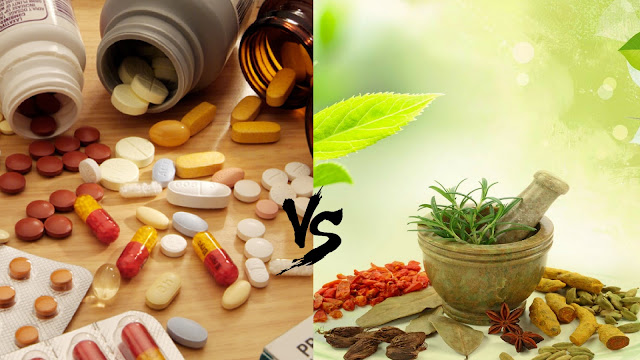AYURVEDA OR ALLOPATHY? - THE SUPERIORITY FIGHT
With increase in health awareness among people in the recent years and with the development of technology development, when we or our near and dear ones suffer from a health problem, we immediately tend to search google god for all the possible treatment options available and their outcomes. Most people realize the side effects of chemical drugs used in conventional treatment methods and hence look for alternative safe treatment options and definitely the first preference goes to Ayurveda.
Every system has its own pros and cons, so we cannot argue one is superior over the other. With endless differences in the way of diagnosis, treatment approach and therapeutic action of the medicines, both allopathy and Ayurveda can treat a patient. This post will help in a better understanding of both the systems of medicine considering their limitations of treatment for health issues.
What to choose in emergency conditions?
If one meets with an accident or suffers a cardiac arrest or falls unconscious, they should be rushed to Allopathy hospital, as allopathy treatment is a blessing in emergency conditions. Although there is mentioning of many lifesaving herbs in ancient Ayurveda texts, these herbs are either extinct or there is confusion with the plant identification.
What is the treatment approach in Allopathy and Ayurveda?
In Allopathy, treatment approach and evaluation of improvement is based on the symptoms and biochemistry changes. But in Ayurveda suitable herbs and therapies are administered after assessment of one’s Prakriti (Body constitution) and Vikruti (Imbalance of the body humors).
A synergistic approach for a healthy society
Use of herbs and allopathy medicines in complementary fashion can maximize the therapeutic outcome. This can emerge as a cost-effective productive healing option with reduced toxicities.
Along with intake of Ayurveda herbs, what you consume and the lifestyle you follow are important to get the most out of treatment. Expertise of the physician, compliance of the patient and quality of medicine plays an important role in treatment.
Do Ayurveda treatment give permanent relief to a health problem?
Ayurveda herbs not only give symptomatic relief but also help in eliminating the root cause of the problem, enhancing body’s immunity and restoring the physiological functioning of the cells thereby helping one achieve long lasting health benefits leading to permanent cure or remission. Allopathy medicine only gives temporary relief from the problem. Many health problems like diabetes are only controllable with treatment, may it be Allopathy or Ayurveda. However, Ayurvedic treatment approach helps to improve one’s overall health and immunity whereas allopathy treatment
Ayurveda treatment is chosen as a last resort when every other treatment fails. By this time the chemical drugs we have consumed would have produced harmful side effects and suppress our immunity.
Is it true that Ayurveda medicines are free from side effects?
The adverse effects of antibiotics, steroids, tranquilizers, painkillers and other chemical medicines are well known. However, we cannot prejudice that Ayurveda medicines are totally free from side effects. Ayurveda medicines containing metals, gems and minerals can cause adverse effects if not properly purified, processed or administered.
What is the microbiome concept?
The microbiome concept is emerging recently and there is a lot of on-going research on this concept. Healthy adult humans each typically harbour more than 1000 species of bacteria, which contribute to metabolic functions, protect against pathogens, educate the immune system, and through these basic functions, they affect most of the physiological functions either directly or indirectly. Alterations in the microbiota due to changes in diet, bowel functions, intake of antibiotics can lead to disease states.
Unlike antibiotics / antimicrobials, Ayurveda herbs do not kill the bacteria / eukaryotic microbes, instead they appease them to behave well and restore to normalcy. Killing approach with antibiotics make the microbiome retaliate.
What is the therapeutic action of herbs for achieving health benefits?
Herbs have several active ingredients and herbal ingredients work synergistically to contribute to the therapeutic effects of each individual ingredient. Also, as the herb is used as a whole, a single herb produces multiple health benefits. Whereas synthetic drugs are synthesized chemically and usually contain one highly concentrated active ingredient that act on a single health problem. Even the phytosterols and oestrogens or other components present in the herbs in the natural form hence does not produce any adverse effects as they are not synthetically processed.
Do Ayurveda treatments act as an alternative to surgery?
Ayurveda is a holistic, totalistic, individualistic approach, which considers a person as a whole not just treat the disease. The only available treatment for many problems like cervical spondylosis, slipped disc, knee arthritis, pinched nerve in Allopathy system of medicine is surgical intervention. Whereas Ayurvedic non - invasive procedures when combined with physiotherapy are very safe and effective in relieving pain and discomfort thereby helping to improve your health condition without surgery.

Comments
Post a Comment